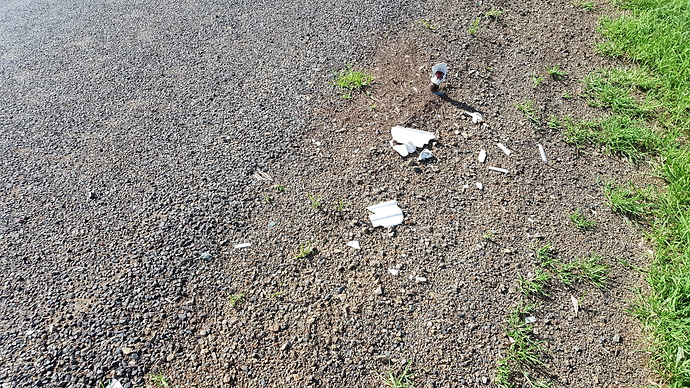Another source of plastics in the environment, which will eventually end up in rivers and oceans are the brittle plastic roadside posts now in use. Since the outcome of using these plastic posts is very obvious, yet they continue to be used, in my view this is deliberate trashing of the environment by local government. I’m not sure how extensively they are used across the country, but Tamworth Regional Council has certainly been putting them along every road in recent years.
I cycle 1500+km of mostly TRC’s roads each month, and there are hundreds of these smashed posts along the roadsides. Often the smashing is done by council graders, and they just leave the smashed posts lying beside the road and install new ones. There are hundreds of instances of this nearby. Photo I took this morning of one that’s been beside the site of some recent council earthmoving work to install a weir and remove water from the Peel River.
Another source often seen particularly in cities and near intersections is small pieces (10mm or less) of shattered plastic from crashes. Over time there has been an increasing amount observed, as use of plastic increases to make cars lighter and shapes more aerodynamic. It is possible a necessary evil in the chase to minimise ICE fuel use and associated emissions…as well as minimising the weight and improving the efficiency of hydrogen and battery vehicles.
Then, they came for our beads. 
Meet eurythenes plasticus, the plastic prawn.
Not plastic:
Where does all the plastic that gets into our oceans end up? Much of it comes back to us.
Note: Canada’s Liberals are not like Australia’s “Liberals”.
What’s left after 1,000 years? Probably tiny bits of plastic.
A couple of articles regarding research into converting unwanted polyethylene into valuable material.
Maybe use a glass bottle?
Are there many glass choices these days, plastic in this area seems ubiquitous in it’s use
When babes learn to play games like “Baby throw down mummy pick up” you can see why.
Isn’t that why they invented carpets and rugs? 
They don’t work all that well when over hard surfaces, like kitchen tiles. Children also seem to be able to find the places where rugs don’t reach.
With our young one, we used glass until the first time it was dropped/thrown and it smashed into thousands of pieces (tempered glass) on the kitchen floor. While we took care to thoroughly clean the floor, glass was found under the fridge and dishwasher a few months later. While broken tempered glass doesn’t produce long sharp dagger pieces, the small pieces formes still have very sharp edges and can easily cut. This convinced us to avoid glass. We looked at aluminium ones but ended going back to plastic.
The other thing is all baby bottles have plastic, even the glass and aluminium ones we could find. the cap and teats are made plastic and/or silicone (which is a plastic as well). Unfortunately one can’t avoid plastic on baby bottles.
Sorry my humour was not well identified, it was intended to be a humourous post rather than a suggestion one. We had 5 children so we understand the risks very well, it doesn’t matter how old we get the risk of shattered glass remains. I want the transparent Aluminium they used to make a holding tank in a Star Trek movie to transport the Whales into the future. It would be recyclable, strong, light (tempered glass isn’t light), and of course you could see through it.
Even rubber teats of yesteryear had issues for those who were/are latex sensitive or allergic. If it is a metal cap then it needs a washer to keep it watertight, so on it goes, we need new ways to address the issues, I’m sure they are not insurmountable if minds are put to task on it.
No I realised it was humour…and agree that a transparent aluminium one with a solid aluminium teat (with a small hole) would fit the bill perfectly.
A couple of interesting articles regarding plastic waste.
Was plastic recycling always spin?
Starting in the late 1980s, the plastics industry spent tens of millions of dollars promoting recycling through ads, recycling projects and public relations, telling people plastic could be and should be recycled.
But their own internal records dating back to the 1970s show that industry officials long knew that recycling plastic on a large scale was unlikely to ever be economically viable.
A report sent to top industry executives in April 1973 called recycling plastic “costly” and “difficult.” It called sorting it “infeasible,” saying “there is no recovery from obsolete products.” Another document a year later was candid: There is “serious doubt” widespread plastic recycling “can ever be made viable on an economic basis.”
Researchers have developed an alternative to plastics.
